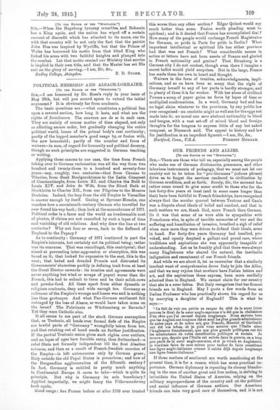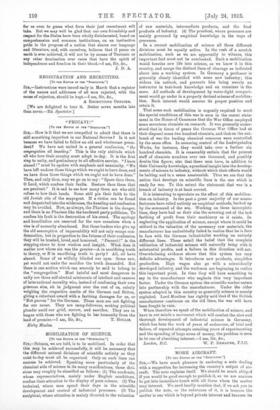OUR FRIENDS AND ALLIES. [To Tax Roma or mu "Srzerkroz.."1
Sin,—There are those who tell us, especially among the people who make use of German dictionaries, grammars, and other laborious instruments of pedagogy, that we must not let our
anxiety not to be taken for "pro-Germans" (odious phrase) drive us to forget the services rendered to civilization by
German erudition, and so forth. Surely, Sir, the moment has
rather come round to give some credit to those who for the last forty-five years at least (and in some cases longer than
that) have been faithful to French friendships, have recognized always that the secular quarrel between Teutons and Gauls was a dispute about ideals of belief and conduct, and that in such matters we are, thank God, more French than German_ So it was that some of us were able to sympathize with Frenchmen who, in spite of terrible memories of war and the suffering and humiliation of invasion, breathed a sigh of relief when once more they were driven to defend their ideals, arms in hand. For forty-five years Germany had insulted, pro-
voked, and openly despised a gallant and proud race, whose traditions and aspirations she was apparently incapable of understanding. Let us be frankly glad that there were always many Englishmen who shared the natural, the inevitable indignation and resentment of our French friends.
And while we are about it, let us remember that a similarly insolent want of comprehension drove Italy to join the Allies and that we may rejoice that nowhere have Italian letters ani art, and the aspirations these express, been more cordially admired than in England. We cannot claim for our country
that she is a sosur Latins. But Italy recognizes that her firmest friends are in England. May I quote a few words from an
Italian Professor who has practically shown his regard for us by marrying a daughter of England? This is what he says
:- "Le fait de voir ma patrie se ranger du o8t6 de Is scour (vows pouvex le dire) de in scour anglo-saxonne n'a 6t6 que la realisation d'un rave quo rat earess6 depuis longtemps. Noise savions tour quo lee Anglais out toujours 44 et sent lea plus grands admirateurs de metre pays et de notre art, que Fosoolo, Masisini it Garibaldi ont 4t6 vos hates, et je pais vous assurer qua Malls alma l'Angleterre franoliement, quo nos plus grands politiques ont 6t6 les adrairateurs de votre constitution politique et social°. .To trouve quo, depuis que rItalie est entrée dans In guerre, on a trop peu par16 de Is scene anglo-saxonne, at si je vivais en Angleterre, Jo voudrais faire de mon mleux pour taolter de faire constitner une ligue anglo-italianne comma it exists d6j1i depuis longtemps une ligue franoo-italienne."
If these matters of sentiment are worth mentioning at the present time, it is for a reason which has some practical im- portance. German diplomacy is repeating its clumsy blunder-
ing in the case of another great and free nation, is striving to intimidate the United States of America, relying on the military unpreparedness of the country and on the political and social influence of German settlers. Our American friends can take very good care of themselves, and it is not for us even to guess what form their just resentment will take. But we may well be glad that our own friendship and respect for the States have been wholly disinterested, based on comprehension and common institutions, on an instinctive pride in the progress of a nation that shares our language and literature, and, with ourselves, believes that if peace on earth is ever achieved, it will not be by means of Teutonic or any other domination over races that have the spirit of independence and freedom in their blood.—I am, Sir, &c., J. D. A.



































 Previous page
Previous page